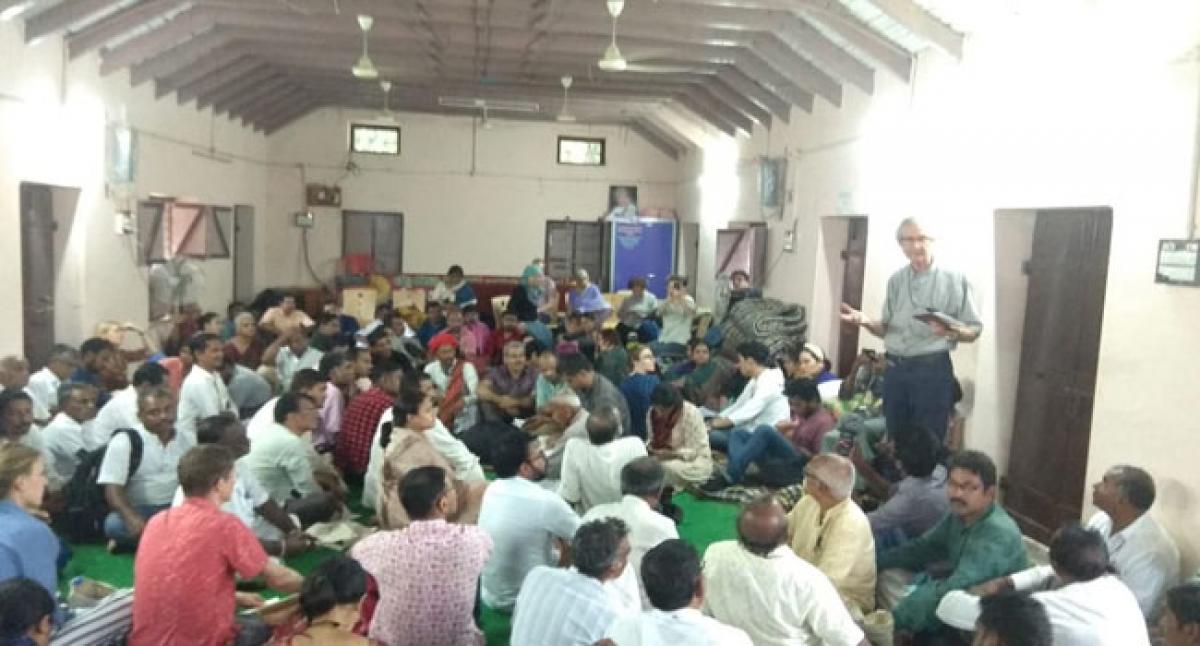Live
- Over 7,600 Syrians return from Turkiye in five days after Assad's downfall: minister
- Delhi BJP leaders stay overnight in 1,194 slum clusters
- Keerthy Suresh and Anthony Thattil Tie the Knot in a Christian Ceremony
- AAP, BJP making false promises to slum dwellers for votes: Delhi Congress
- 'Vere Level Office' Review: A Refreshing Take on Corporate Life with Humor and Heart
- Libya's oil company declares force majeure at key refinery following clashes
- Illegal Rohingyas: BJP seeks Assembly session to implement NRC in Delhi
- Philippines orders full evacuation amid possible volcanic re-eruption
- Government Prioritizes Welfare of the Poor, says Dola Sri Bala Veeranjaneyaswamy
- Two Russian oil tankers with 29 on board damaged due to bad weather
Just In

The weeklong Conference on Innovating Technological Cultures in Craft and Handloom Weaving was held at BV BN High School here from November 1117 The artisans and weavers from 15 Indian states have set up their looms and explained weaving techniques to artisans from various places
Chirala: The week-long 'Conference on Innovating Technological Cultures in Craft and Handloom Weaving' was held at BV & BN High School here from November 11-17. The artisans and weavers from 15 Indian states have set up their looms and explained weaving techniques to artisans from various places.
In the conference, the guests were split into groups for parallel workshops and panel discussions on various topics. GS Nair from Indian Institute of Handloom Technology, Salem, spoke about certain inventions in handloom space that have improved productivity and presented a series of innovations in looms and weaving technologies, developed by IIHT and the weavers service centre Bangalore.
He opined that the future of handloom lay in weavers specialising in high-end and special designs that cannot be replicated by machines. Prof Samrat Mukhopadhyay from IIT Delhi, presented the works done by his team as technology interventions in Chirala.
Hemendra Sharma, an entrepreneur from Madhya Pradesh, shared his experiences of attracting the younger generation of weavers by providing training to them in English, IT tools, and social media.
M Mohan Rao from National Federation of Handlooms and Handicrafts, Prof Weibe Bijke from the University of Maastricht and the renowned designer and Padma Bhushan awardee Rajiv Sethi emphasised on the crucial importance of handloom sector towards advancing human civilisation and in preserving a unique tradition.
Naresh Kumar Sharma from Central University Hyderabad, Uzramma from Malkha Marketing Trust, Sakode from National Handloom Development Corporation (NHDC) and Usha Madhusoodhan from National Bank for Agriculture Research and Development (NABARD) addressed the issues of weavers.
They too agreed that the rates of GST on the products are high and supported the demand from weavers that the handloom products be exempted from GST entirely.
Gunjan Jain from Orissa handloom weavers, Vinay Srinivas from Alternative Law Forum, Bengaluru and Ghatith from Kutch opined that there is a huge gap between the weavers and policy makers with policy making process being less inclusive.
Victoria Vijaykumar of Aranya Natural, Jagada Rajappa, natural dyeing expert, Uzramma and historian professor Ulinka Rublack discussed several innovations using tea waste and successfully indigenised several foreign traditions such as Shibori.
Senthil Babu, a labour expert, Karuna Mariam, a historian and Saravanan, a fish worker and marine expert discussed on various models of production and highlighted the role of women as major labour force in the sector.
Karunaji from Maharashtra shared personal reflection on how he learned the art of weaving and on how relevant it is to convert information into knowledge. Kurma Rao, a senior weaver, also shared his experience in weaving sector. Abhir Gupta, AUD Delhi analysed the pedagogical methods followed by various designer educational institutions in India and pointed out how they end up producing designers as per market requirements with little exposure to traditional knowledge.
Prof Dorothy Ko of Columbia University, Uzramma of Malkha, Karuna Maryam, a historian and Ramanjaneyulu from Centre for Sustainable Agriculture discussed on intimate relationship between handloom weaving and cotton growing.
K Srinivas from Osmania University, Dr Umesh Babu from Delhi Forum, Dr Monami Sinha of Delhi University and Amitha Danda from NALSAR, Hyderabad opined that in order to understand the handloom weavers, a sociological analysis of handloom industry needs to be carried out.
Molly from Timbaktu raised concerns over the health and physical well-being of artisans and weavers. Arup from West Bengal discussed the issue of suicide of farmers that took place in Karnataka and AP.
The daily sessions are ended with the stage performances like Chekkabhajana, Kolatam, playing drums, Odissi and Kathak dances by the artists from various places.

© 2024 Hyderabad Media House Limited/The Hans India. All rights reserved. Powered by hocalwire.com







